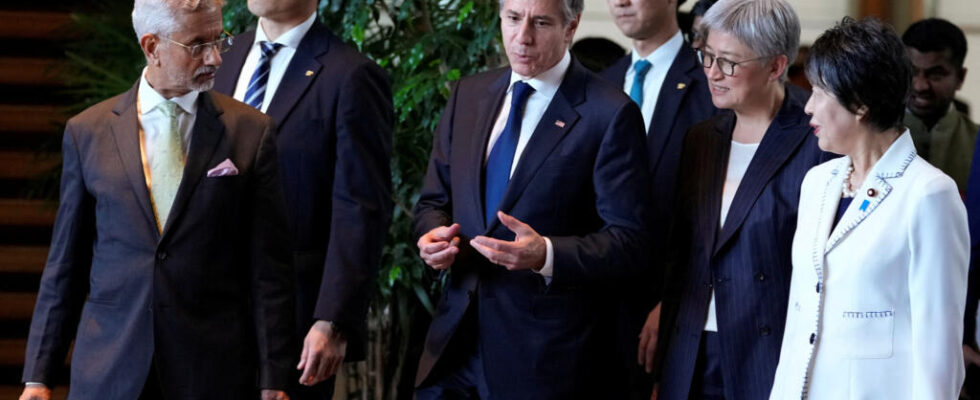In Mongolia, it was the end of Antony Blinken’s tour of Asia, this Thursday, August 1st. The American Secretary of State was on a ten-day Asian tour. He visited six Asian countries: Mongolia, Singapore, Vietnam, Laos, Japan and the Philippines. A trip with a clear desire to reassure the allies of the United States in this strategic area of the Indo-Pacific about a possible return to power of Donald Trump.
3 min
A handshake between three defense ministers to “institutionalize” military ties between Japan, South Korea, and the UNITED STATESThe photo taken in Tokyo this week illustrates the South Korean and Japanese desire to perpetuate ties with Washington beyond the alternations at the White House.
The possibility of a return of Donald Trump business is worried. South Korea is seeking to quickly finalize negotiations on compensation paid to the United States in exchange for the presence of more than 28,000 American soldiers on its soil. Donald Trump wanted to increase South Korea’s financial contribution fivefold. The Japanese neighbor is equally worried, having locked in an agreement until 2027.
Countering China’s influence
The backdrop to this long Asian journey is to counter China’s influence, even if Washington assures that it is not pursuing a policy of containing Beijing, indicates Agence France-Presse. During his visit to the Philippines, Antony Blinken announced that he would be paying $500 million in military aid to Manila, in the context of tensions with Beijing in the South China Sea. Since last year, Washington has had access to a total of nine strategic military bases on Philippine soil. This envelope is intended to modernize the Philippine armed forces and coast guard. It is part of $2 billion in aid allocated in April to the territories of the region by the United States House of Representatives.
Read alsoPhilippines gives US access to four additional military bases
In addition, the United States and Singapore signed an agreement on Wednesday, July 31, which aims to ” deepen » their cooperation on the peaceful use of nuclear energy, as the city-state explores alternative energy sources to reduce its carbon emissions. US Secretary of State Antony Blinken, on a regional tour, and his Singaporean counterpart Vivian Balakrishnan signed the “123 Agreements” on civil nuclear cooperation. A regional financial hub and key player in the global semiconductor industry, Singapore currently relies on oil and natural gas and is exploring options, including nuclear power, to achieve its goal of net-zero carbon emissions by 2050.
It is in Taiwan that the November election is most worrying. No formal agreement obliges the United States to defend the island in the event of an invasion. But the principle has been reaffirmed six times by Joe Biden, who has also granted financial aid to the country. All this could disappear under Donald Trump who has assured that Taipei would have to pay for ” his defense “The island is already largely financing the modernization of its army on its own.
Read alsoUS, China agree to hold talks on ‘balanced economic growth’
